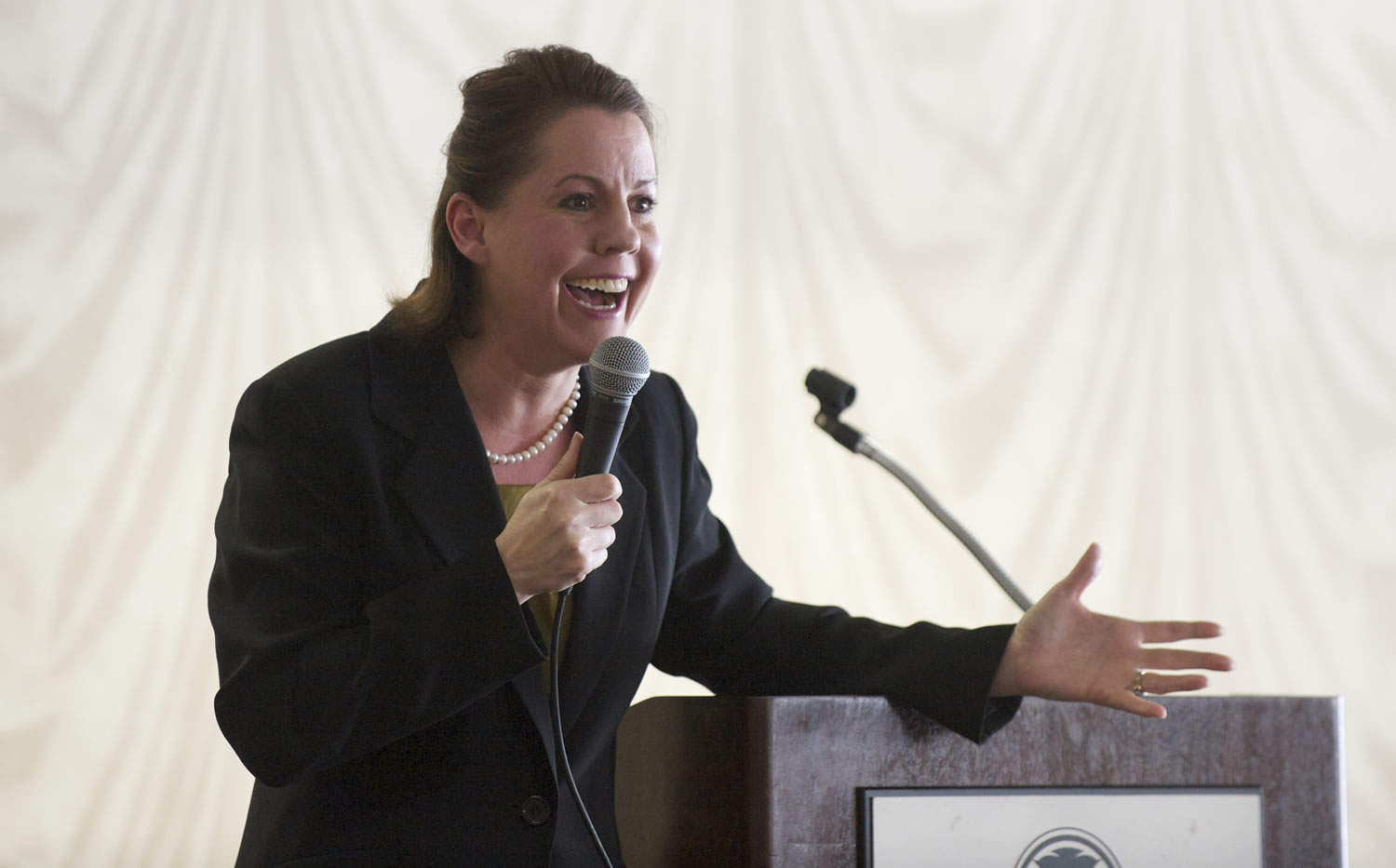Lawmakers from Clark County floated all kinds of ideas Monday about what the Columbia River Crossing project’s death means for Southwest Washington, and where the community should go from here.
Some were reflective on the project’s failure, while others blamed their political adversaries. Some remained stalwart in their opposition to light rail, while others pointed out that a new bridge will still require agreement between high-density Portland and suburban Vancouver. Many called for time to let emotions cool.
No one knew for sure how long it would take to come up with a new plan for the Interstate 5 Bridge.
“I think we need a few moments to let passions and tempers subside, and then I think we have to get back around a table and hammer out a plan that really works,” said state Sen. Ann Rivers, R-La Center.
Rivers, who was instrumental in blocking the CRC project, said she didn’t know how long it would take to come up with another bridge replacement plan, adding: “time is not my primary concern.”
In the meantime, she said, steps should be taken to make the existing bridge safer, including reducing the 50 mph speed limit on the span, prohibiting lane changes while crossing the bridge, and re-evaluating the permitting process for oversized loads.
The CRC project unravelled on Saturday when the state Senate, run by a new conservative majority, refused to take up a transportation gas-tax proposal that would have paid the state’s $450 million share.
“It looks like it’s back to square one,” state Rep. Jim Moeller, D-Vancouver, said Monday. He listed off a host of hoops the project had jumped through — from selecting a locally preferred alternative to getting a federal record of decision — that will have to be done all over again. Oregon and Washington have spent roughly two decades discussing a plan to replace the I-5 Bridge, and $170 million was spent on planning the CRC project.
Lessons learned
Moeller said he’s learned two important lessons so far from the project’s failure. Those planning a new bridge should try to engage the middle-of-the road, everyday citizen about the project, rather than its most active opponents and supporters, he said. He also said the new project should be “less utilitarian and more iconic … something that people can get behind and want to leave to their kids and their grandkids.”
Also, “there needs to be a much shorter process,” Moeller said, adding that it’s hard to maintain momentum on a project when the people who started the initial discussions on the CRC are long gone. “The institutional memory of why we did what we did is gone.”
The project’s blunder over the height of the new bridge also struck a critical blow to CRC supporters.
“I think the biggest surprise was that the bridge was designed too low. Everybody seemed to be caught off guard by the aspect that the Coast Guard was going to weigh in,” Moeller said. “It was a constant black eye that supporters had.”
Other options
State Sen. Annette Cleveland, D-Vancouver, said opponents of the CRC were quick to criticize but less willing to offer a clear solution.
“Frankly, the opposition has said all along that they have a better solution, so I’m really anxious to see what that plan looks like,” Cleveland said. “We have to look at what we can agree on. … This isn’t a decision Washington can make solely on its own.”
State Rep. Paul Harris, R-Vancouver, said he could see himself as a “third-bridge guy,” which would mean leaving the I-5 Bridge alone for a few decades and building another bridge over the Columbia River. Harris said he could see that bridge being constructed at Southeast 192nd Avenue in Vancouver, or between the industrial hubs of Vancouver and Portland.
Harris also said the I-5 Bridge could be retrofitted to better withstand an earthquake, and the nearby BNSF Railway bridge could be rebuilt in a way that makes it easier for cargo to maneuver under the tallest part of the I-5 Bridge.
Rivers said she is open to hearing from Southwest Washington residents about a new bridge plan. In the end, Harris and Rivers said, a new bridge must alleviate traffic congestion for Clark County residents commuting to Portland.
Working with Oregon
Rivers and other CRC opponents said they hope Oregon reconsiders its desire to place light rail on a new I-5 bridge.
“Portland is trying to force people out of their cars,” Harris said. “I believe people in Clark County are probably just the opposite of that. We tend to be more rural people.”
But those who had supported the CRC were skeptical Oregon leaders would change their minds.
“I supported light rail and tolling as a funding mechanism before,” Moeller said. “I suspect that will be the requirements of Oregon again, but you never can tell.”
A good compromise, Harris said, could be to build a new bridge that is designed so light rail could be added later, if Vancouver becomes populous enough for light rail to make sense.
Federal support
Southwest Washington’s representatives at the federal level said they are committed to replacing the I-5 Columbia River bridge.
U.S. Rep. Jaime Herrera Beutler, R-Camas, said Monday that the community needs to move forward on a new project, and it needs to make sure “the mistakes of the past are not repeated.” Herrera Beutler opposed the CRC as planned, and she helped write a 2014 draft transportation budget that included no federal money for its construction.
“No matter how we felt about the CRC, now is the time for all of us to come to the table and find a way forward,” Herrera Beutler said in a statement. “It’s too soon to give a date-certain, but I believe if we are all dedicated to the task we can have a plan ready to go relatively quickly. … As soon as we are ready to move forward with a project my community can support, I will be ready to make sure the federal government pays its fair share of maintaining and upgrading this interstate highway.”
U.S. Sen. Patty Murray, D-Wash., blasted state Republicans for letting the $10 billion transportation package fail.
“I’m extremely disappointed that Washington state Senate Republicans simply refused to act to address the real transportation needs across our state, particularly the crumbling I-5 bridge between Vancouver and Portland,” Murray said Monday in a statement.
Murray said the bridge still needs to be replaced and that reinvesting in the state’s transportation infrastructure “will require action from those in Olympia who refuse to acknowledge the impact that outdated roads and bridges are having on our state’s economy.”
Stevie Mathieu: 360-735-4523; http://facebook.com/reportermathieu; http://twitter.com/col_politics; stevie.mathieu@columbian.com.




